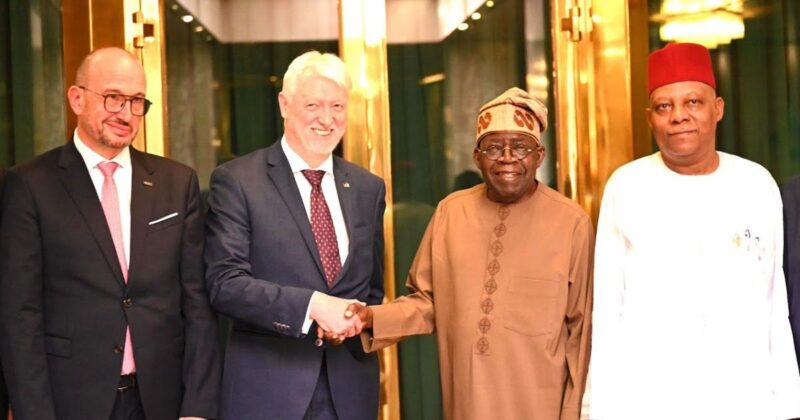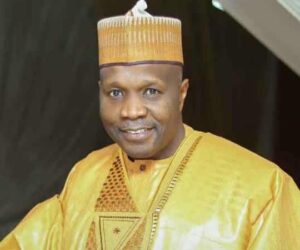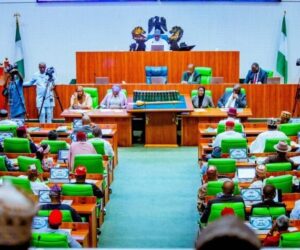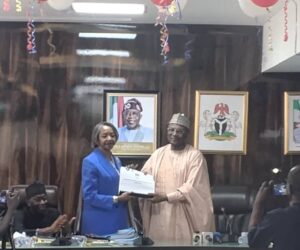President Bola Tinubu says the progress of the Siemens power
project is notable, but falls short of the expected level.
Tinubu spoke on Monday at a meeting at the State House with
a delegation from Siemens Energy, led by Dietmar Siersdorfer, its managing
director (MD) of Middle East and Africa.
“I appreciate the partnership on the initiative. The
progress of the project to date is notable, and we can feel it. But it is not
where we want it to be,” he said.
Also, Tinubu assured Siemens Energy, the technical
contractor handling the presidential power initiative (PPI), of the
government’s unwavering commitment to improving Nigeria’s electricity supply
and enhancing the livelihoods of its citizens.
He emphasised that the power sector remains pivotal to
driving economic growth, particularly within the industrial, educational, and
healthcare sectors.
The president said the completion of the phased power
project would position Nigeria for greater prominence on the African continent
by unlocking the latent potential of its human and material resources across
various sectors.
“There is no industrial growth or economic development
without power. I believe that power is the most significant discovery of
humanity in the last 1,000 years,” he said.
“We appreciate the support and commitment of the German
government and Siemens. The investment you are making and your commitment align
with the future of this country.
“Our education, our health care and our transportation all
depend on energy and without power, it is an impossible objective. We are
taking it very seriously.”
TINUBU DIRECTS EXPANSION OF MAJOR TRANSFORMER SUBSTATIONS
The president also directed the expansion of some major
transformer substations from two to three phases to boost the country’s
electricity supply.
“We are all inspired and happy. This is what we want to
achieve on the continent. We want everyone to see the glory of our economic
recovery and banishment of poverty,’’ he said.
The president assured the delegation that the government
will continue to provide the necessary resources to support the power project.
Also speaking, Adelabu noted that the president signed the
Electricity Act 2023, and a national integrated electricity policy was
developed after 24 years, attracting more than $2 billion of new investments.
The minister said that the policy had led to the activation
of fifteen state electricity markets.
“Since the signing of the Accelerated Agreement at COP28 in
Dubai in December 2023, an event you personally attended alongside the German
Chancellor Olaf Scholz, the PPI has recorded notable milestones across its
implementation phases” he said.
“Under the Pilot phase (Phase Zero), we have achieved
significant infrastructure upgrades and capacity enhancements that are already
impacting grid stability and reliability across the country.
“Siemens Energy has successfully delivered and commissioned
10 units of 132/33kV mobile substations, three units of 75/100MVA transformers,
and seven units of 60/66MVA transformers across key load centres nationwide,
which have added 984mv of transmission capacity to the grid.”
Adelabu said in December 2024, the federal executive council
(FEC) approved the commencement of the engineering, procurement, and
construction (EPC) contract for phase one, batch one of the PPI.
The minister added that the project scope includes the
upgrade, installation, and commissioning of five key substations located in
Abeokuta, Offa, Ayede-Ibadan, Sokoto, and Onitsha.
“I am pleased to report that plans for civil works
mobilisation across all five locations have been finalised, concurrent
manufacturing of the required equipment is ongoing, and two of the five
substations are targeted for completion by the end of 2026,” he said.
“As we consolidate the gains from the Pilot Phase and Phase
One-First Batch, we are also preparing to advance to Phase One-Batch two, which
has a scope for the construction of new substations and the upgrade of existing
ones across key load centres nationwide.
“Collectively, Phase One -Batch Two of the PPI comprises a
total of six (6) Brownfield and ten (10) Greenfield substations with a
cumulative impact of 4,104MW.”
On his part, Siersdorfer said two of the five substations
currently under construction are expected to be completed by December 2026.
‘TRAINING CENTER IS BEING BUILT TO DEVELOP LOCAL TALENTS’
Siersdorfer said that a training centre is already being
built to develop local talent in electrical engineering, create additional
jobs, promote local content, and facilitate technology transfer.
“The PPI is not just a project but a platform for long-term
development and prosperity,’’ he said.
The MD said the PPI will transform Nigeria into a regional
power hub, reflecting the depth of relations between Germany and Nigeria.
Siersdorfer added that Nigerian professionals will be
engaged directly in the five project sites “in Batch 1 for the site works,
while thousands of jobs will be enabled in the local communities through
purchased services, accommodation, and transportation, among others”.
Click to signup for FREE news updates, latest information and hottest gists everyday
Advertise on NigerianEye.com to reach thousands of our daily users









